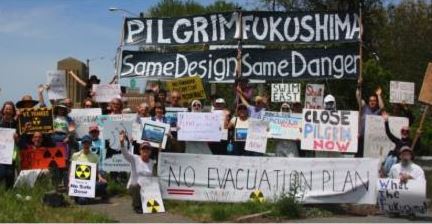
Proposed NRC rule changes raise safety concerns
By Christine LegerePosted May 23, 2018
Revisions aimed at curbing exemptions sought after reactor shutdowns.
PLYMOUTH — A U.S. senator who has been a longtime critic of the Nuclear Regulatory Commission’s oversight of the nation’s 99 nuclear power reactors is calling the latest report on the agency’s proposed rule changes for reactor decommissioning “an industry wish list that makes exemptions the rule.”
The rule changes are particularly significant to the residents Sen. Edward Markey, D-Mass., represents, as the state’s only nuclear reactor, Pilgrim Nuclear Power Station, is set to permanently shut down by May 31, 2019.
Pilgrim’s coastal location makes it particularly vulnerable to the effects of climate change. The rules contain no new requirements for considering environmental impacts, Markey said.
“This is a missed opportunity to put down a marker for smarter decommissioning,” Markey said in a written statement about the proposal. “I urge the Commission to strengthen this draft rule to ensure safety and not expediency is paramount.”
The new rules are aimed at cutting down the long list of exemptions and amendments owners seek once their plants shut down.
Currently 20 reactors are undergoing decommissioning, according to the Nuclear Regulatory Commission’s website.
The tweaks focus on emergency preparedness, physical security, cybersecurity, training requirements for fuel handlers, use of decommissioning trust funds and on- and off-site financial protection requirements (insurance) — all items for which owners of decommissioning plants seek exemptions.
This week’s report said the changing of the rules “is cost-beneficial to the nuclear industry, government and society.”
As an example, NRC spokesman Neil Sheehan noted the owner of Oyster Creek nuclear plant, now shut down, is looking to reduce its insurance from $1 billion to $50 million via an exemption from the commission. Under the new rules, no exemption would be required.
Mary Lampert, a Duxbury resident and president of Pilgrim Watch, expressed concern over the rule changes.
“The ‘savings’ to state and local governments and the public have nothing to do with public health and safety — in fact the contrary,” Lampert wrote in an email. If there were no license amendment and exemption requests followed by an NRC review, “the public would have no opportunity to tell the NRC the other side of the story.”
The NRC report noted that areas such as emergency preparedness and a plant’s related emergency planning zones would be handled under a graded approach after a reactor was shut down. Currently, plant owners seek to eliminate the emergency planning zones beyond the borders of their properties about 10 months after reactor shutdown. Benchmarks in the rules, based on the cooling of the fuel and its location in fuel pools or dry casks, would do away with the need for the exemption request.
David Lochbaum, director of the Nuclear Safety Program for the Union of Concerned Scientists, said he had not yet thoroughly analyzed the document released by the NRC.
Lochbaum said his organization was generally in agreement that NRC regulation requirements could be “reduced as the hazard drops,” but “criteria for the down steps should be ties to real hazard changes rather than artificial calendar times.”
Sheehan noted the decommissioning rules have several steps ahead before final approval, and some of those will allow for public input.
The draft final rules are expected to be submitted to the commission for a vote in the fall of 2019.
No comments:
Post a Comment